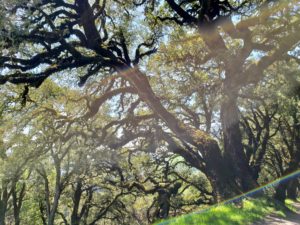 “Can you help me belong somewhere again?”
“Can you help me belong somewhere again?”
Childhood abuse and family secrets can lead to a lifelong difficulty with belonging. My clients who’ve had these experiences – which is most of them, to one degree or another – in adulthood, can find themselves repeatedly stumbling in work and relationships. Something about belonging has gotten deeply injured. They are coming to constellations for help.
Belonging sounds great. When it goes well, it is great. It is also non-negotiable – belonging is a deep human need, and when we don’t seem to have it, we suffer. So, my clients come asking for a good kind of belonging.
But Bert Hellinger, along with many other observers of human systems, reminds us that belonging is not simple. First, he taught that belonging actually isn’t an option: we always belong to our families, our countries, our neighborhoods, and to many other systems. Even if we are thrown out of our families or we walked away from them, we still belong.
Additionally, belonging is a spectacularly deep driver of human behavior. Belonging will make a soldier dive in front of bullets, insuring their death. Belonging will make a parent do something similar for a child. These are amazing instincts. But they can serve darker purposes as well. Belonging can make us do terrible things, sometimes consciously, often unconsciously.
 One example we are just starting to understand is “implicit bias.” Just by belonging, and navigating all the opportunities and stresses of being whoever we are in our cultures, we acquire certain kinds of ways of seeing the world that go well past our conscious awareness. We cannot fully avoid them, and still belong.
One example we are just starting to understand is “implicit bias.” Just by belonging, and navigating all the opportunities and stresses of being whoever we are in our cultures, we acquire certain kinds of ways of seeing the world that go well past our conscious awareness. We cannot fully avoid them, and still belong.
Bert Hellinger noticed something remarkable and disturbing as he worked in post-Nazi Germany: people had done the most awful things with a perfectly good conscience. The old saying is “the child of thieves who steals does not feel guilty.” And, “the child of thieves who does not steal, feels guilty.”
A deep-seated and mostly unconscious experience of innocence or guilt is directing us, encouraging certain behaviors and dissuading others. It’s the ancient survival pressures of the tribe, and it is powerful business.
As I write now, we are grieving the loss of George Floyd from a few days ago, and protests and violence are taking place in Minneapolis and other places. It’s time to remember the dark side of belonging. Because it is belonging to white supremacy, and the innocence of that belonging, that continues to fuel these violations and resulting rage.
As James Baldwin wrote: “It is not permissible that the authors of devastation should also be innocent. It is the innocence which constitutes the crime.” White anti-racist activist Tim Wise reflects: “White America has a long and storied tradition of not knowing, and I don’t mean this in the sense of genuinely blameless ignorance. This ignorance is nothing if not cultivated by the larger workings of the culture. We have come by this obliviousness honestly, but in a way for which we cannot escape culpability.”
 This is the innocence of belonging, and it is capable of outrageous violence. You might understandably wonder then, regardless of who you are and what you belong to, whether you can ever truly “transcend” those patterns of belonging. That is, can the child of thieves ever learn how not to steal? We cannot fully transcend our most serious belongings, but there are ways to learn and imperfectly abide by new patterns, if we truly desire it. How?
This is the innocence of belonging, and it is capable of outrageous violence. You might understandably wonder then, regardless of who you are and what you belong to, whether you can ever truly “transcend” those patterns of belonging. That is, can the child of thieves ever learn how not to steal? We cannot fully transcend our most serious belongings, but there are ways to learn and imperfectly abide by new patterns, if we truly desire it. How?
Bert Hellinger noted that we have many, many belongings, some of them harmonious, but many of them in conflict. For a somewhat trivial example, what if you belong both to a church and to a soccer team, and they both meet on Sunday morning? What do you choose? Either way, you will be guilty with respect to the belonging norms of one of them.
But here is the good news: the need to make a choice clarifies your values and forces you to act in accord with them. Conflicting belonging systems can be very uncomfortable, but they tend to force growth if we can engage the conflict with our whole hearts. It’s what makes it possible for the child of thieves to decide not to steal; she belongs not only to her family, but to a larger system of humans for which theft isn’t a value. As those systems collide, she will need to decide what is right for her.
Doesn’t this sound nice? But Bert Hellinger warns us, this is rarely a very “nice” process, especially for situations where the belonging patterns are really intense, like family, nation, race and gender. Hellinger warns us: “To be alive is to be guilty.” Making choices does not alleviate us of what it means to violate the norms of some of the systems to which we belong; and we don’t actually cease belonging to them (again, in the case of higher stakes systems like our families).
Instead, Hellinger advises us, we are called to endure and live with the guilt – with dignity, maturity, wisdom and hopefully, the support of others who’ve made a similar difficult choice. If we decide that the system we are going to align ourselves with is the larger system of humanity, we will be in violation of other belongings. We will be disloyal.
 Alternatively, if we decide to be loyal to those more local belongings, we will be disloyal to our belonging to a larger humanity, and perhaps become violators of our fellow humans. There’s no way out of this dilemma. But it strengthens us to face it squarely, and with respect for the systems that bore and first nurtured us.
Alternatively, if we decide to be loyal to those more local belongings, we will be disloyal to our belonging to a larger humanity, and perhaps become violators of our fellow humans. There’s no way out of this dilemma. But it strengthens us to face it squarely, and with respect for the systems that bore and first nurtured us.
I do not want to be coy about this. I know where I wish to stand. I am trying to be loyal to the larger humanity, while being guilty with respect to my inevitable belonging to white post-colonial systems. All of my ancestors were part of that system, as far as I can tell. Some of them were “more guilty” or “less guilty” than others, which in the long run, doesn’t matter greatly, although I am deeply grateful for the few who really tried to choose differently than their belonging insisted, and in some ways, made a genuine difference. (I’m talking to you, you wonderful and baffling Colorado socialists!) And, I belong to them. I always will. I honor that they gave me life.
And, I belong to a larger humanity which teaches me something different than white post-colonial culture. I am trying to allow that conflict to make me sufficiently uncomfortable to force some decisions. It is good news that I am not alone in this.
I know we are all still enduring this pandemic, even as life goes on and other events, like what is going on in Minneapolis, also require our heart-felt attention. As we find ourselves poorly led through this moment, in a way that is encouraging us to double-down on our most simple and perhaps comforting but divisive senses of belonging, in a way that only drives the potential for violence, this issue is profoundly alive for us in USA, and for many of you who live in other countries, too. As we open our hearts to the real consequences of this virus, not just for us but globally, we realize of course that it’s all connected: the poor and oppressed themselves suffer the most.
How do you acknowledge the belongings that you are trying to be disloyal to, even as you honor that they are part of who you are? What other belongings are demanding your increased attention? Please share on my blog below your journey with belonging as we continue this journey through the pandemic, and life, together.
I found it really helpful to think about the local family and humanity, the circles of belonging that I’m a part of. Thank you. It actually brings me comfort to see these choices before me.
Oh, I am so glad it brings some comfort. It’s counter-interintuitive, but it’s true. The First Order of Love is Acknowledging What Is (Bert Hellinger). Being able to see how it is allows for the relief of that tension that comes from maintaining an exclusion, and releases that energy for choice. Thanks for naming that.
This is so rich!
Since I was eight, I was aware of and abhored the overt racism in my mother’s NC family. I’d didn’t notice what was happening in my dad’s Tennessee family, because we rarely went there. Then a family history care out in the 50’s, tracing 7/8 of my ancestors to before the Revolutionary War. That history documented the belied that the world is made for man’s use, and that it was right for us white people to tear down trees to build stockades should the marauding savages come by. After the war, my people refused to give back to “their” land to the Cherokees, treaty be damned. It was their demands that led to the Trail of Tears.
I was surprised that few of my ancestors held slaves, but most of them could not afford it. Still they upheld the system and many relatives still see the Confederate monuments as history.
How am I called to turn around this horrid legacy? Part of the answer has been to be grateful that they did come here in spite of great danger, and use the energy of gratitude for transformation. The pandemic has called me to stay more in the present, to do what I can to be healthy and keep on serving the best I can. The hardest part of this call is to reconnect with my extended family in humility instead of judgment, and prepare to be surprised with the humanness I find there. Also, to stop hiding away from what in the fmaily I find terrifying. Not easy, but I don’t see any other way to release the shame and guilt of our past , then building a better present and future.
Hi Pat! Thanks for your personal reflections. I love what you say about not hiding from your family. “What we resist, persists.” White folk need to turn and face their ancestors, both with the appropriate respect we hold for our predecessors, and a commitment to take the life they gave us to risk disloyalty. Oddly, it’s the best respect there is, in a way…
Thank you for writing this relevant piece! Belonging is a deep process and you’ve given opportunity for each of us to unpack our choices right now.
You’re welcome Karla! Whatever strengthens us…
This was so well-stated, Leslie. Thank you!
Thanks Anne!
My grandmother stood up to the Klan in the 30’s. Before that? My European ancestors farmed land in the Massachusetts Bay Colony. The intricacies of conscious belonging are full of paradox and complicity. Right now I’m choosing to stay safer at home rather than join the Denver protest, and I’m trying to stay with the discomfort of my decision . The dread I feel every time I leave my home for public spaces is beyond my ability to override it today. I cannot imagine the decades and centuries of risking survival every time I leave home.
Thanks for this vulnerable share, Robin. I had some similar ancestors in Colorado in the 20s, for whom I am deeply grateful. That dread is a complex stew, part of it personal, a lot of it multi-system, and as we do what we need to do for self-care, it’s worth some extra inquiry, for all of us…
Hi Leslie – I’m very touched by your illumination of these pieces. The secrets of alcoholism, incest, my dad’s covert work, etc. all fit right into my dark side of belonging. I’m struggling with belonging in my job, even though I am executive director of my org and you just shed some light on this for me.
It makes me want another constellation, so I’m going to sign up now 🙂
Thank you so very much for this illumination. With love ~ Chuck
Wow, Chuck, thank you for this deep reflection. Yes, this is one of the directions that this information takes us. We see our own family trauma patterns through a new lens, one that can be deeply transformational for us.